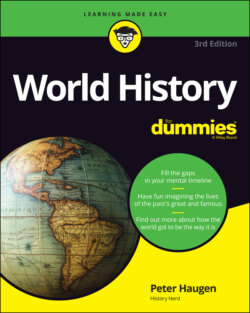Читать книгу World History For Dummies - Peter Haugen - Страница 48
Verifying virtue
ОглавлениеHistory celebrates the strong, especially those who wielded military or political power. Sometimes, it seems to be exclusively about those who fought — for territory, for defense, for wealth, and so on. Yet there have also been fighters for ideals. Too often, peaceful idealists are left out of history’s stories. The exceptions are idealist leaders whose courage resulted in political or cultural change. Prime examples include the following two men:
Mohandas Karamchand Gandhi (1869–1948): Known as the Mahatma, or great soul, he fought discrimination against Indian people in South Africa and then, after returning to his home country, fought for India’s independence from Great Britain — without striking a literal blow. Gandhi adopted the idea of nonviolent civil disobedience espoused by American writer Henry David Thoreau (1817–62) and in turn inspired American civil-rights leader Dr. Martin Luther King, Jr.
Dr. Martin Luther King, Jr. (1929–68): King was inspired by Mahatma Gandhi to use nonviolent protest against racial discrimination in the United States in the 1950s and 1960s. He played a major role in winning popular support for the landmark Civil Rights Act of 1964, legislation that outlawed segregation by race in schools, in the workplace, and at public facilities.
Gandhi and King brought about change and stirred resistance. Each was human, and humans are flawed. Gandhi has been accused, posthumously, of racism toward blacks during the 21 years that he lived in South Africa before returning to India. While King was still alive, the Federal Bureau of Investigation accused him of having extramarital affairs. Yet each man sought to make the world better, and both arguably succeeded to some extent. Had their efforts been entirely in vain, Gandhi and King may have been seen as ineffectual dreamers. (Turn to Chapter 22 for more about Gandhi and King.)
